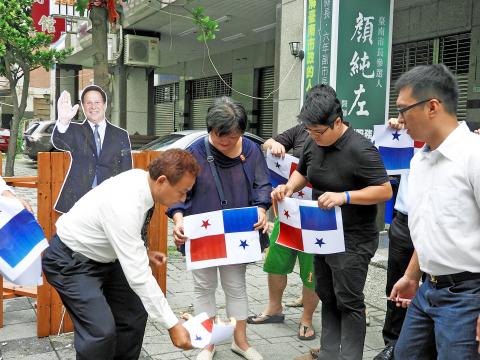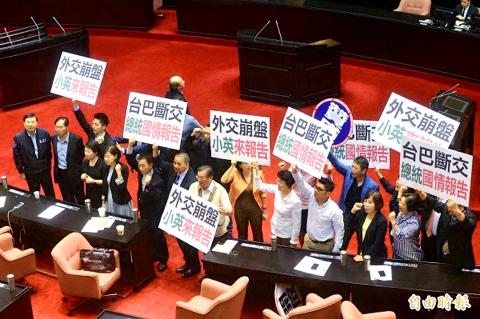Following Panama’s severing of ties with Taiwan in favor of Beijing on Tuesday, one country has asked Taiwanese representatives to leave within a week and five other countries or territories are under pressure from China to rename the Taiwanese representative offices they host, the Ministry of Foreign Affairs (MOFA) said yesterday.
One of the five, Dubai, yesterday officially changed the Taiwanese office’s title under pressure from Beijing, the ministry said, adding that two of the nation’s 20 diplomatic allies are “medium-risk countries” that might shift diplomatic recognition.
The nation’s representative office in Dubai was originally registered as “The Commercial Office of the Republic of China to Dubai,” but the name was changed to “The Commercial Office of Taipei” after tremendous pressure from China, the ministry said, adding that the terminology was in line with the majority of nation’s representative offices globally.

Photo: Chiu Hao-tang, Taipei Times
Among countries and territories with which Taiwan has no formal relations, six have allowed Taiwanese representative offices to use the name Republic of China (ROC), and one allows the use of the name “Taiwan.”
However, China has been pressuring five of those seven countries to rename the offices, Department of West Asian and African Affairs Director-General Chen Chun-shen (陳俊賢) told a news conference.
Beijing has been coercing Nigeria, Dubai, Jordan, Ecuador and Bahrain to force the offices to change their names, presumably into “Taipei Representative Office” or a name less suggestive of Taiwanese sovereignty, Chen said.

Photo: Wang Yi-sung, Taipei Times
The Nigerian government yesterday reportedly told the Taiwanese representative office to leave the capital, Abuja, within one week or it would not guarantee the safety of the mission’s staff.
MOFA confirmed that it received a notice on March 31 from the Nigerian Ministry of Foreign Affairs demanding that the government remove Representative Chao Chia-pao (趙家寶) from the country or it would not guarantee his safety.
The mission in Nigeria has been closed since April, and Chao has turned to Taiwan, but some representatives have remained in the country, Chen said.
Chen had summoned Nigeria’s envoy to Taiwan to protest the extremely unfriendly actions of the Nigerian government, the ministry said.
The government is observing the actions of the Nigerian government and will respond in kind to the Nigeria Trade Office in Taiwan, it said.
The ministry has been attempting to open a line of communication with the Nigerian government since January, when Nigerian Minister of Foreign Affairs Geoffrey Onyeama demanded that Taiwan relocate its representative office to Lagos, change its name and reduce its staff, it said.
Although the ministry is willing to find a solution acceptable to both sides, the Nigerian government had caved in to China’s bullying demands and refused to negotiate, it said.
The ministry deeply regrets the turn of events and will continue to negotiate with Nigeria on the basis of dignity and reciprocity, it said.
Among the nation’s 20 diplomatic allies, two have been marked “yellow,” suggesting a risk of diplomatic deterioration according to the ministry’s three-color indicator system, Chen said.
Chen refused to reveal which two countries they are to prevent any further Chinese intervention, adding that no countries are marked as “red.”
However, Panama was marked “green” when it decided to sever diplomatic ties with Taiwan, suggesting flaws in the ministry’s intelligence collection system, he said.
Democratic Progressive Party (DPP) lawmakers asked the ministry to reassess ties with diplomatic allies as if they were all marked “red,” because there is no sign of China easing pressure on Taiwan.
Meanwhile, President Tsai Ing-wen (蔡英文) said the nation would not cave in to pressure, despite Beijing’s relentless aggression.
“It is internationally understood that Beijing is unilaterally changing the ‘status quo’ in cross-strait relations. Its provocation does not only affect regional peace and stability, but has destroyed interactions between Taiwan and China,” Tsai said at the DPP’s Central Standing Committee meeting.
“Under such circumstances, we will re-evaluate the cross-strait situation and we will be firmer against pressure [from Beijing]. We will definitely not compromise under threat,” she said.
The national security team has done everything it could to ensure Taiwan’s survival in the international arena, but the nation refuses to make compromises on national dignity and sovereignty, she said.
Taiwan could solidify relations with other countries with its soft power and maintain its presence in the international realm, she said. “Although faced with Chinese pressure and unfavorable international conditions, Taiwan’s values and status in the international society will stay unchanged,” Tsai said.

SECURITY: As China is ‘reshaping’ Hong Kong’s population, Taiwan must raise the eligibility threshold for applications from Hong Kongers, Chiu Chui-cheng said When Hong Kong and Macau citizens apply for residency in Taiwan, it would be under a new category that includes a “national security observation period,” Mainland Affairs Council (MAC) Minister Chiu Chui-cheng (邱垂正) said yesterday. President William Lai (賴清德) on March 13 announced 17 strategies to counter China’s aggression toward Taiwan, including incorporating national security considerations into the review process for residency applications from Hong Kong and Macau citizens. The situation in Hong Kong is constantly changing, Chiu said to media yesterday on the sidelines of the Taipei Technology Run hosted by the Taipei Neihu Technology Park Development Association. With

CARROT AND STICK: While unrelenting in its military threats, China attracted nearly 40,000 Taiwanese to over 400 business events last year Nearly 40,000 Taiwanese last year joined industry events in China, such as conferences and trade fairs, supported by the Chinese government, a study showed yesterday, as Beijing ramps up a charm offensive toward Taipei alongside military pressure. China has long taken a carrot-and-stick approach to Taiwan, threatening it with the prospect of military action while reaching out to those it believes are amenable to Beijing’s point of view. Taiwanese security officials are wary of what they see as Beijing’s influence campaigns to sway public opinion after Taipei and Beijing gradually resumed travel links halted by the COVID-19 pandemic, but the scale of

A US Marine Corps regiment equipped with Naval Strike Missiles (NSM) is set to participate in the upcoming Balikatan 25 exercise in the Luzon Strait, marking the system’s first-ever deployment in the Philippines. US and Philippine officials have separately confirmed that the Navy Marine Expeditionary Ship Interdiction System (NMESIS) — the mobile launch platform for the Naval Strike Missile — would take part in the joint exercise. The missiles are being deployed to “a strategic first island chain chokepoint” in the waters between Taiwan proper and the Philippines, US-based Naval News reported. “The Luzon Strait and Bashi Channel represent a critical access

Pope Francis is be laid to rest on Saturday after lying in state for three days in St Peter’s Basilica, where the faithful are expected to flock to pay their respects to history’s first Latin American pontiff. The cardinals met yesterday in the Vatican’s synod hall to chart the next steps before a conclave begins to choose Francis’ successor, as condolences poured in from around the world. According to current norms, the conclave must begin between May 5 and 10. The cardinals set the funeral for Saturday at 10am in St Peter’s Square, to be celebrated by the dean of the College